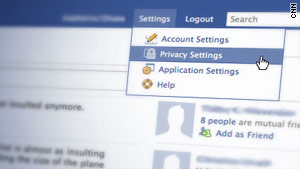Scammer
Banned

Facebook users will be able to log off the site from their cell phone and get a temporary password to use on public computers under new security changes.
The updates, announced Tuesday on Facebook's official blog, come as the social networking juggernaut observes National Cyber Security Awareness Month.
"From our standpoint, safety and security is a core part of Facebook and a core part of the user experience," Joe Sullivan, Facebook's chief security officer, told CNN in a telephone interview. "It's a core part of the ways we innovate as a company."
The "one-time passwords" will be available to users when they're on computers at libraries, hotels or other public places where they feel their regular password might be compromised.
Users can now text "otp" to 32665 on their mobile phones. They'll immediately get a password that can be used only once and expires in 20 minutes.
The feature is being rolled out gradually and should be available to all Facebook members in the next few weeks, according to the blog.
A new tweak also will let users find out if they're logged on to Facebook on another computer.
"Have you ever borrowed a friend's phone to use Facebook and then forgotten to log out before you handed it back?" read a blog post from last month promoting the pending feature. "Maybe you logged in from a public computer, but accidentally walked away with your Facebook session still active."
Users will now be able to go to their Account Settings page, find a list of all the computers on which they are currently logged in and shut down the unauthorized log-ins.
That feature is already available to all users.
Sullivan was promoting Facebook's efforts to help parents ensure their children are using Facebook, and the rest of the internet, responsibly. He commented on a host of issues to CNN, including:
On Facebook's 13-year-old age requirement
While it's begrudgingly acknowledged by parents that tweens are giving false ages to get onto the site, Sullivan said Facebook, which began as a college-student-only community, takes its minimum age of 13 seriously.
"We don't want anyone under 13 on the site," he said. "We do have a bunch of different technical and policy measures in place to try and prevent that."
He urges parents to be involved early on as their kids start using the internet and to make sure they understand Facebook and the other sites they visit.
"As a starting point, we want to encourage parents to start talking about internet safety at much younger ages," he said. "Internet safety is not a conversation, it's an ongoing dialogue."
On keeping computers up to date
One little-discussed way to defend against viruses, hacking and other online threats is to avoid using outdated software, according to Sullivan.
Always download updates to virus software and web browsers when they're offered, or set them to download updates automatically, he said.
"The web browser that came out several years ago, like Internet Explorer 6, does not have the same safety features built into it that Internet Explorer 8 does," he said. "You're in a very different and much more vulnerable place if you're using those older browsers."
On the parental "I don't understand" dodge
It's on the wane as the digital age progresses, but a classic parent excuse for not monitoring children's online behavior is that they don't understand computers as well as the younger generation.
That's no good anymore, Sullivan said.
"It's just not acceptable for a parent to abdicate responsibility in this important area ...," he said. "At one point, cars were new and the older generation didn't say, 'It's not my responsibility to teach my kid to watch out for that car.' "
One way to combat ignorance about your kid's favorite websites? Sign up, then get your child to show you how to use them. It helps you understand and, at the same time, ensure that your children know how to keep themselves safe.
On cyberbullying
With cyberbullying and its real-world dangers becoming more prevalent, Facebook -- where teens can instantly talk to hundreds of friends -- has become an obvious place for it to spread.
The site has launched video initiatives and other projects, including a partnership with the PTA, to address cyberbullying in the past year.
"We spend a great deal of time here behind the scenes trying to make sure cyberbullying never happens on Facebook," Sullivan said. "But if it does, we want to make sure to take it down quickly."
Read more about how to protect your child from cyberbullying
Sullivan said that when Facebook users report abuse, staff members work hard to investigate and deal with it as quickly as possible.
